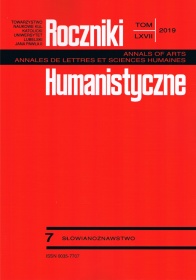Phraseological Subcompetence of the Students of Neophilology as a Component of a Translator’s Linguistic Competence. Pilot Study
Abstract
The aim of the research described in the article is the diagnosis of the level of phraseological subcompetence of the students of neophilology, who started studies with translation specialisation. Phraseological competence is considered an inseparable element of translator’s linguistic competence and it corresponds to correct use of relatively stabilised and even slightly lexicalised phrasemes in oral and written form. Survey method was used in the research. The task of respondents was to name defining features of phraseologism and to indicate phrasological units in the provided list of phrasemes. On the basis of conducted survey, it can be stated that in opinion of the respondents, it is prevalently idioms that meet the criterion of phraseology. Phraseologism is considered traditionally, stereotypically, and most of all, idiomatically by the students of neophilology (according to W.W. Winogradow). Repondents have difficulties finding the features of phraseological unit in partly lexicalised structures – phrasemes (according to theory of W. Chlebda). This understanding of phraseology in turn often results in atomistic translation of phrasemes, which usually leads to violation of the rules of target language. The conclusion of conducted pilot study induces to take action in terms of reorientation of the phraseological subcompetence, from the purely idiomatic perspective to phrasematic, which will certainly contribute to the improvement of quality of translation results.
References
Bogusławski, Andrzej. “Uwagi o pracy nad frazeologią”. Studia z polskiej leksykografii współczesnej. T. 3. Red. Zygmunt Saloni. Białystok: Wydawnictwo Uniwersytetu Warszawskiego. Filia Białystok, 1989. 13-30.
Chlebda, Wojciech. Elementy frazematyki. Wprowadzenie do frazeologii nadawcy. Łask: Wydawnictwo Leksem, 2003.
Chlebda, Wojciech. “Nieautomatyczne drogi dochodzenia do reproduktów wielowyrazowych”. Na tropach reproduktów. W poszukiwaniu wielowyrazowych jednostek języka. Red. Wojciech Chlebda. Opole: Wydawnictwo Uniwersytetu Opolskiego, 2010. 15-35.
Grzeszkiewicz-Radulska, Katarzyna. “Metody badań pilotażowych”. Folia Sociologica v. 42 (2012): 113-141.
Kielar, Barbara. Zarys translatoryki. Warszawa: Katedra Języków Specjalistycznych UW, 2003.
Kopczyński, Andrzej. Conference Interpreting. Poznań: Wydawnictwo Uniwersytetu im. A. Mickiewicza w Poznaniu, 1980.
Lewicki, Roman. Zagadnienia lingwistyki przekładu. Lublin: Wydawnictwo Uniwersytetu Marii Curie-Skłodowskiej, 2017.
Pieńkos, Jerzy. Podstawy przekładoznawstwa. Od teorii do praktyki. Zakamycze: Kantor Wydawniczy Zakamycze, 2003.
Płusa, Paweł. Rozwijanie kompetencji przekładu i kształcenie tłumaczy. Katowice: Wydawnictwo Uniwersytetu Śląskiego, 2007.
Skorupka, Stanisław. Słownik frazeologiczny języka polskiego. T. 1-2. Wyd. IX. Warszawa: Wiedza Powszechna, 1999.
Szutkowski, Tomasz. Współczesna paremiografia rosyjska i polska. Stan. Problemy. Perspektywy. Szczecin: Volumina.pl, 2015.
Алексеенко, Михаил. “Ещё раз о нерешённых проблемах фразеологии”. Slavica Stetinensia 8 (1998): 83-103 [Alekseyenko, Mikhail, “Yeshchё raz o nereshёnnykh problemakh frazeologii”. Slavica Stetinensia 8 (1998): 83-103].
Виноградов, Виктор. “Об основных типах фразеологических единиц в русском языке”. Виктор Виноградов. Избранные труды. Лексикология и лексикография. Москва: Наука, 1977. 140-161 [Vinogradov, Viktor. “Ob osnovnykh tipakh frazeologicheskikh yedinits v russkom yazyke”. Viktor Vinogradov. Izbrannyye trudy. Leksikologiya i leksikografiya. Moskva: Nauka, 1977. 140-161].
Copyright (c) 2019 Roczniki Humanistyczne

This work is licensed under a Creative Commons Attribution-NonCommercial-NoDerivatives 4.0 International License.





